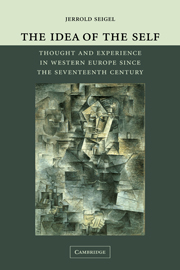Book contents
- Frontmatter
- Contents
- Acknowledgments
- PART I INTRODUCTORY
- PART II BRITISH MODERNITY
- PART III SOCIETY AND SELF-KNOWLEDGE: FRANCE FROM OLD REGIME TO RESTORATION
- PART IV THE WORLD AND THE SELF IN GERMAN IDEALISM
- PART V MODERN VISIONS AND ILLUSIONS
- 13 Dejection, insight, and self-making: Coleridge and Mill
- 14 From cultivated subjectivity to the culte du moi: polarities of self-formation in nineteenth-century France
- 15 Society and selfhood reconciled: Janet, Fouillé, and Bergson
- 16 Will, reflection, and self-overcoming: Schopenhauer and Nietzsche
- 17 Being and transcendence: Heidegger
- 18 Deaths and transfigurations of the self: Foucault and Derrida
- 19 Epilogue
- Notes
- Index
18 - Deaths and transfigurations of the self: Foucault and Derrida
Published online by Cambridge University Press: 05 June 2012
- Frontmatter
- Contents
- Acknowledgments
- PART I INTRODUCTORY
- PART II BRITISH MODERNITY
- PART III SOCIETY AND SELF-KNOWLEDGE: FRANCE FROM OLD REGIME TO RESTORATION
- PART IV THE WORLD AND THE SELF IN GERMAN IDEALISM
- PART V MODERN VISIONS AND ILLUSIONS
- 13 Dejection, insight, and self-making: Coleridge and Mill
- 14 From cultivated subjectivity to the culte du moi: polarities of self-formation in nineteenth-century France
- 15 Society and selfhood reconciled: Janet, Fouillé, and Bergson
- 16 Will, reflection, and self-overcoming: Schopenhauer and Nietzsche
- 17 Being and transcendence: Heidegger
- 18 Deaths and transfigurations of the self: Foucault and Derrida
- 19 Epilogue
- Notes
- Index
Summary
Nietzsche's and Heidegger's views about selfhood moved to the center of late twentieth-century intellectual consciousness and debate, both in Europe and in the United States, largely through the agency of a group of French thinkers loosely grouped together as “post-structuralists” or “post-modernists.” We deal here with two of them, the most prominent and influential, Michel Foucault and Jacques Derrida. Both were instrumental in fostering claims about the death of the author, the dissolution of the self, or the disappearance of the human subject. As noted at the start of this book, these claims combined two seemingly contradictory images, one of which represented human individuals as rigidly constricted by the social and cultural conditions where their formation takes place, while the other portrayed human possibilities as radically open and unlimited. In this final chapter we examine the relationship between these double-sided visions as they appear in Foucault and Derrida, and the history we have tried to reconstruct – at least in some of its pieces – so far.
Throughout his life, Michel Foucault presented the self simultaneously in terms of radical liberation and of rigid constraint. These alternatives were at work in every phase of his career, bridging over the apparently diverse subjects about which he wrote and the contrasting approaches he took to them. Often he cherished these discontinuities as signs of a freedom that only unconstrained fluidity could give, or of a determination to alter his way of being, but sometimes he cited them instead as omens that his efforts to change were insufficient and needed constantly to be started up again.
- Type
- Chapter
- Information
- The Idea of the SelfThought and Experience in Western Europe since the Seventeenth Century, pp. 603 - 650Publisher: Cambridge University PressPrint publication year: 2005
- 1
- Cited by

